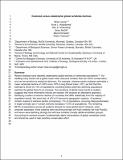Files in this item
Clustered versus catastrophic global vertebrate declines
Item metadata
| dc.contributor.author | Leung, Brian | |
| dc.contributor.author | Hargreaves, Anna L. | |
| dc.contributor.author | Greenberg, Dan A. | |
| dc.contributor.author | McGill, Brian | |
| dc.contributor.author | Dornelas, Maria | |
| dc.contributor.author | Freeman, Robin | |
| dc.date.accessioned | 2021-05-17T23:51:24Z | |
| dc.date.available | 2021-05-17T23:51:24Z | |
| dc.date.issued | 2020-12-10 | |
| dc.identifier | 271317079 | |
| dc.identifier | 71dd9334-3f64-42b2-8562-e9cf1da870cc | |
| dc.identifier | 000591047800007 | |
| dc.identifier | 85096221046 | |
| dc.identifier.citation | Leung , B , Hargreaves , A L , Greenberg , D A , McGill , B , Dornelas , M & Freeman , R 2020 , ' Clustered versus catastrophic global vertebrate declines ' , Nature , vol. 588 , no. 7837 , pp. 267-271 . https://doi.org/10.1038/s41586-020-2920-6 | en |
| dc.identifier.issn | 1476-4687 | |
| dc.identifier.other | RIS: urn:E6C6C1B9B46C8F455BA796C3E0C3A45E | |
| dc.identifier.other | RIS: Leung2020 | |
| dc.identifier.uri | https://hdl.handle.net/10023/23213 | |
| dc.description | Funding: This work was supported by a Natural Sciences and Engineering Research Council (NSERC) Discovery grant to B.L. | en |
| dc.description.abstract | Recent analyses have reported catastrophic global declines in vertebrate populations1,2. However, the distillation of many trends into a global mean index obscures the variation that can inform conservation measures and can be sensitive to analytical decisions. For example, previous analyses have estimated a mean vertebrate decline of more than 50% since 1970 (Living Planet Index2). Here we show, however, that this estimate is driven by less than 3% of vertebrate populations; if these extremely declining populations are excluded, the global trend switches to an increase. The sensitivity of global mean trends to outliers suggests that more informative indices are needed. We propose an alternative approach, which identifies clusters of extreme decline (or increase) that differ statistically from the majority of population trends. We show that, of taxonomic–geographic systems in the Living Planet Index, 16 systems contain clusters of extreme decline (comprising around 1% of populations; these extreme declines occur disproportionately in larger animals) and 7 contain extreme increases (around 0.4% of populations). The remaining 98.6% of populations across all systems showed no mean global trend. However, when analysed separately, three systems were declining strongly with high certainty (all in the Indo-Pacific region) and seven were declining strongly but with less certainty (mostly reptile and amphibian groups). Accounting for extreme clusters fundamentally alters the interpretation of global vertebrate trends and should be used to help to prioritize conservation efforts. | |
| dc.format.extent | 18 | |
| dc.format.extent | 312430 | |
| dc.language.iso | eng | |
| dc.relation.ispartof | Nature | en |
| dc.subject | QH301 Biology | en |
| dc.subject | DAS | en |
| dc.subject | BDC | en |
| dc.subject | R2C | en |
| dc.subject.lcc | QH301 | en |
| dc.title | Clustered versus catastrophic global vertebrate declines | en |
| dc.type | Journal article | en |
| dc.contributor.institution | University of St Andrews. School of Biology | en |
| dc.contributor.institution | University of St Andrews. Centre for Biological Diversity | en |
| dc.contributor.institution | University of St Andrews. Fish Behaviour and Biodiversity Research Group | en |
| dc.contributor.institution | University of St Andrews. Marine Alliance for Science & Technology Scotland | en |
| dc.identifier.doi | https://doi.org/10.1038/s41586-020-2920-6 | |
| dc.description.status | Peer reviewed | en |
| dc.date.embargoedUntil | 2021-05-18 |
This item appears in the following Collection(s)
Items in the St Andrews Research Repository are protected by copyright, with all rights reserved, unless otherwise indicated.

